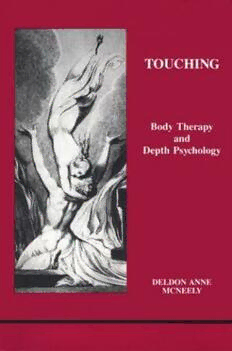
Touching: Body Therapy and Depth Psychology (Studies in Jungian Psychology, No 30) PDF
Preview Touching: Body Therapy and Depth Psychology (Studies in Jungian Psychology, No 30)
title: Touching : Body Therapy and Depth Psychology Studies in Jungian Psychology ; 30 author: McNeely, Deldon Anne. publisher: Inner City Books isbn10 | asin: 0919123295 print isbn13: 9780919123298 ebook isbn13: 9780585116594 language: English subject Mind and body therapies, Psychoanalysis, Jungian psychology. publication date: 1987 lcc: RC489.M53M38 1987eb ddc: 616.89/17 subject: Mind and body therapies, Psychoanalysis, Jungian psychology. Page 1 Touching Page 2 Marie-Louise von Franz, Honorary Patron Studies in Jungian Psychology by Jungian Analysts Daryl Sharp, General Editor Page 3 Touching Body Therapy and Depth Psychology Deldon Anne McNeely Page 4 To my patients and my childrenRomany, Jonathan and Yseultewho teach me so much and indulge my absences to write. Canadian Cataloguing in Publication Data McNeely, Deldon Anne Touching: body therapy and depth psychology (Studies in Jungian psychology by Jungian analysts; 30) Bibliography: p. Includes index ISBN 0-919123-29-5 1. Psychoanalysis. 2. Mind and body therapies. 3. Jung, C. G. (Carl Gustav), 1875-1961. I. Title. II. Series. BF175.M26 1987 150.19'54 C87-094477-0 Copyright © 1987 by Deldon Anne McNeely All rights reserved. INNER CITY BOOKS Box 1271, Station Q, Toronto, Canada M4T 2P4 Telephone (416) 927-0355 Honorary Patron: Marie-Louise von Franz. Publisher and General Editor: Daryl Sharp. Business Development: Vicki Cowan. Editorial Board: Fraser Boa, Daryl Sharp, Marion Woodman. Production Assistants: Ben Sharp, David Sharp. INNER CITY BOOKS was founded in 1980 to promote the understanding and practical application of the work of C.G. Jung. Cover: William Blake, The Reunion of the Soul and the Body. (See illustration, page 104, and text, pages 107-108.) Index by Daryl Sharp Printed and bound in Canada by University of Toronto Press Incorporated Page 5 Contents Introduction 9 1 15 Physiological Origins of Depth Psychology Freudian Psychoanalysis 15 Jungian Complex Theory 16 2 21 Body Therapy in Historical Perspective The Cultural Background 21 Pioneers in Body Therapy 27 Therapists of Later Influence 43 The Contributions of Dance Movement 44 Contemporary Body Therapists 49 Personal Influences 51 3 59 Integrating Body Therapy and Depth Psychology Introduction 59 Touch and the Analytic Model 62 The Meaning of Touch 67 Gratification in Analysis 69 Touch and Transference 76 Touch and Timing in Analysis 80 Body Therapy and Dream Interpretation 86 Touching and Analytic Training 93 Body Therapy and Jungian Typology 99 4 105 Experiencing the Unus Mundus Notes 109 Glossary of Jungian Terms 115 Bibliography 117 Index 121 See final pages for descriptions of other Inner City Books Page 6 Acknowledgments Special thanks to Bill Walker and Ann Mankowitz for their careful contributions to the articulation of Her message. I am grateful also to Tom Lavin, Marcel Gaumond, Arnold Mindell, Malcolm Brown, Clarisse Estes and Curtis Brooks for their support and suggestions, and to Eugene Monick and Gary Hartman for helpful critiques of the original manuscript. I especially thank Lee and Joan for permission to use their material. Page 7 In 1925, D.H. Lawrence, poetic prophet, has the risen Christ say: Dare I come into touch? For this is further than death. I have dared to let them lay hands on me and put me to death. But dare I come into this tender touch of life? Oh, this is harder. . . . "The Man Who Died." Page 8 The Loving Touch. (Eros and Psyche, antique sculpture. Capitoline Museum, Rome) Page 9 Introduction In D.H. Lawrence's short story, "The Man Who Died," Christ awakens, bruised and emaciated, and is found by a young priestess of Isis. As she cares for his bodily and psychological wounds and nurtures him back to health, he comes to realize a whole new relationship to his physical body. At the decisive moment Christ must either acknowledge his bodily needs as his vitality returns, or turn away from this opportunity for relatedness . . . "Dare I come into touch?" 1 I take this to be a crucial question at this point in the evolution of psychotherapy. Lawrence could be considered a prophet inasmuch as he envisions and anticipates in this metaphorical piecewritten long before sensitivity- training, the women's movement and the self-examination going on now in the Christian churchissues of which psychotherapy has only recently become aware. He shows us a holy approach to the body; he gives us images for a healthy embodied spirit. He provides in this story a fantasy that leads us to wonder what our world would be like if the early church "fathers" had included some mothers. Through the development and advancement of Logosthe logical mindwhich Western man has accomplished through a progression of articulate and brilliant thinkers, we have sharpened our discriminative powers to analyze and dissect. We have taken the scientific spirit to its ultimate and now are in the throes of what Carl Jung called "enantiodromia." This term, borrowed from Greek philosophy, describes the moment when a force has reached its extreme and turns back on itself to become its opposite. We are seeing the great turning around from the dominance of the masculine values of Logos, the great analyzer and divider, toward the feminine principle with its values based on Eros, the great unifier and connector. Maternal religions are creation oriented, not achievement oriented. This emphasis on life-giving forces is necessary to maintain our planet. We are all agents bringing life into this analytic world.
